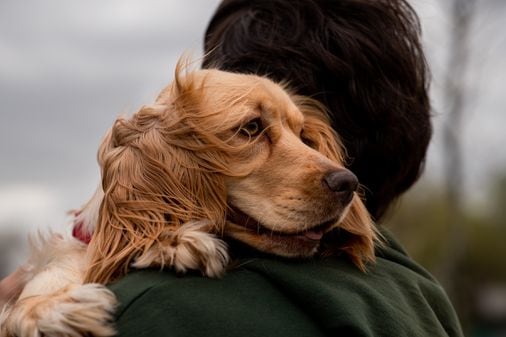[ad_1]
The facts of the case are disturbing — Tipper was suffering from various ailments, including a large necrotic mass. But in my view Russo shouldn’t have been prosecuted. The SJC ruled earlier this week that there wasn’t enough “evidence of criminal intent to sustain a charge of animal cruelty” against Russo. It was a ruling with limited scope, but the SJC got it right.
One thing is certain: The case underscores the need to refine the state law criminalizing cruelty to animals.
In early 2021, Russo brought Tipper to an animal hospital on the South Shore to get a large mass removed from the dog’s side, according to court documents. It was her second visit in less than a month. The veterinarian, after examining Tipper and realizing the severity of his condition — he had bed sores, an open wound, and couldn’t stand or walk — recommended that he should be put down. There was nothing else to be done and the dog was in severe pain, according to the veterinarian.
Russo said she’d bring Tipper to another clinic to get him euthanized, but she never did. Instead, she took him home. The vet, suspecting this to be the case, contacted the Animal Rescue League of Boston the next day to report the situation.
The ARL then assigned a police officer authorized to enforce the state’s animal cruelty prevention laws to the case. The officer visited Russo’s home to check on Tipper. He reported the dog looked deceased at first sight, but then he realized he had shallow breathing. He also noticed the dog had a distended stomach and raw-looking sores.
The officer’s report triggered what happened next: He obtained a warrant, seized Tipper, and euthanized him.
The following month, Russo was charged with violating the animal cruelty statute. The complaint alleged that she allowed Tipper to experience “unnecessary suffering,” which is a crime under the law.
Lynsey Legier, a staff attorney at the Massachusetts Society for the Prevention of Cruelty to Animals’s animal protection division, told me that law enforcement agencies have a duty to prevent suffering. “The reason they apply for a search warrant and seize an animal,” Legier said, “is because they are watching it suffer. That’s the only remedy in the law.” In this particular set of circumstances, she said, “the only option to prevent that suffering happened to be humane euthanasia.”
But the law governing animal abuse is problematic because it lumps everyone together, Jeremy Cohen, a lawyer who specializes in pet law in the Boston area who’s not involved in the Russo case, said in an interview. In the ruling, “the SJC said ‘we can only charge people with a crime for something that’s already identified as something you can’t do or must do under the statute.’ ”
Cohen said he believes police powers are too broad. “So much is based on the eye test right now,” Cohen said. “If your dog is too fat or if you purposely stabbed a dog, you’re charged with the same crime.” For that reason, the Legislature should clarify the animal cruelty statute.
Here’s what said statute says: It imposes criminal penalties on anyone who “having the charge or custody of an animal … knowingly and willfully authorizes it or permits it to be subjected to unnecessary torture, suffering or cruelty.”
A lower court, ruling earlier to dismiss the criminal complaint against Russo, found no case law “in which a person’s failure to intervene with the complicated, heartbreaking, painful end of an animal’s life has been interpreted as ‘subjecting’ an animal to statutorily prohibited harm.”
The SJC concluded there was no evidence to show Russo had ill intent. But Legier warned against interpreting the ruling too broadly. “This isn’t the court condoning suffering,” she said.
Russo did seek medical care for Tipper and only wanted for him to die at home. One can deem her irrational, perhaps, and someone who’s holding on to hope and struggling to accept the inevitable. But to call it illegal and charge Russo with a crime punishable with prison time after the state took her dog and euthanized him? That feels like a blunt intervention, kind of outrageous, actually. Where’s the empathy for her?
Having said that, I also feel a tremendous amount of sympathy for lawyers and law enforcement officers tasked with investigating animal abuse. It’s an immensely challenging and emotionally taxing job. But so is deciding when to euthanize a pet — it’s a deeply personal, nuanced, and complex process, filled with pain. And while I fully support the advocacy efforts of organizations like the ARL and MSPCA, Russo’s seems to have been the wrong case to make a strong statement in favor of animal protections.
For a pet owner, there is no right time. We’re never ready to say goodbye. Letting go and choosing to end the life of a beloved animal, a family member who’s dying, is perhaps the most difficult thing about pet ownership. The law, meant to punish cruelty, shouldn’t criminalize compassion.
Have you had to euthanize a pet? How did you know it was time? Tell me about your experience in the survey below, and your responses may be used in a follow-up column.
Marcela García is a Globe columnist. She can be reached at [email protected]. Follow her @marcela_elisa and on Instagram @marcela_elisa.
[ad_2]
